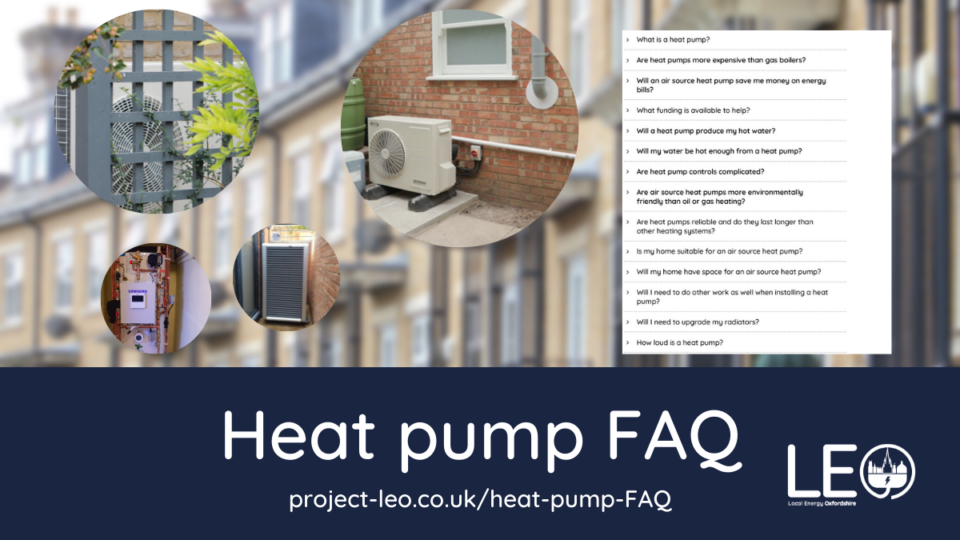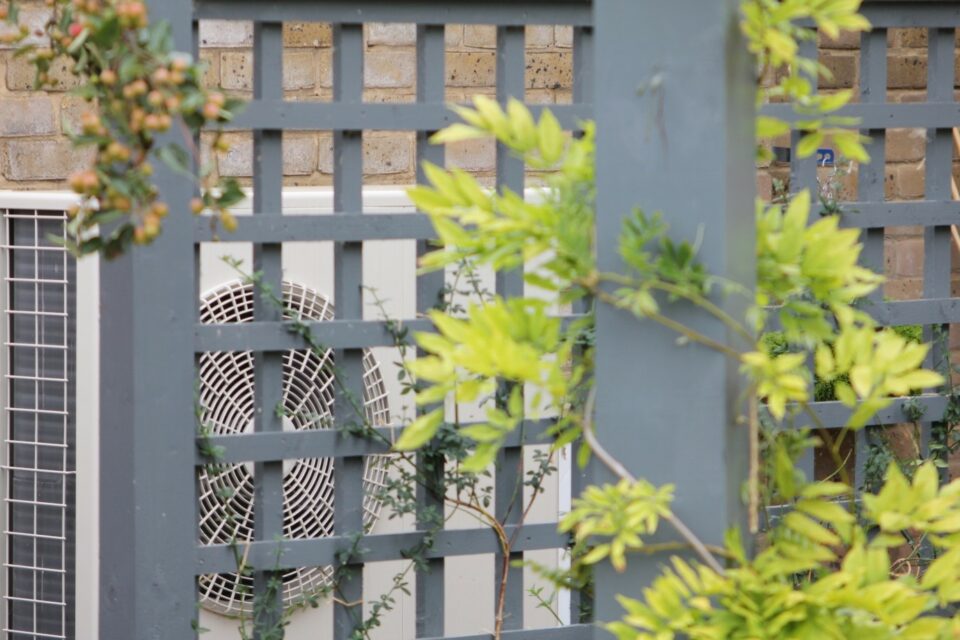Heat pump FAQ
Community groups in one of Project LEO’s Smart and Fair Neighbourhood trials has put together a list of commonly asked questions and answers around heat pumps.
To take action on climate change and reduce the carbon emissions from heating and cooling our homes, there has been a growing interest in heat pumps in the UK.
You might be considering if a heat pump could save you money, whether it can keep you warm and supplied with hot water, and whether it would be suitable for your home.

The concept may seem strange to us, but actually in all our homes we have fridges, and it’s very much like a fridge working back to front.
Geordie Stewart – Cosy Homes Oxfordshire
Low Carbon Hub, with help from Deddington Environment Network and Sustainable Duns Tew, and Cosy Homes Oxfordshire have put together some of the most frequently asked questions to help you find out the key information on cost, experience and suitability of heat pumps.
The resource has been put together as part of the Project LEO Smart and Fair Neighbourhood trial to help enable more homeowners to benefit from flexibility in the energy grid by adopting smart, low carbon technology.
Everyone’s home is different. Before purchasing a heat pump, we recommend researching installers and having an appropriate tradesperson check your home for suitability and assess additional measures. You may need to take to upgrade the fabric of your home (e.g. improve insulation).
What is a heat pump?
A heat pump is an electrically driven device that extracts heat from a low-temperature place and delivers it to a higher-temperature place.
Heat pumps come in three major forms, using energy from natural sources from the air, the ground or water.
Air source heat pumps (ASHPs) and ground source heat pumps are the two most common forms used in UK homes.
There are also water source heat pumps, which require a large body of water, or a river to operate. If you’d like to find out more about water source heat pumps, we’d recommend this article.
Heat pumps can be connected to existing heating systems such as radiators or underfloor heating, or even air conditioning units.
A heat pump is fully reversible, meaning that it can both heat and cool your home.
However, if your unit goes to a wet radiator system, you will then need an entirely separate unit to provide cooling.
Just like with a gas boiler, heat pumps can be turned off, or adjusted by time settings to run as and when you would like them to during hotter months.
The technology has been around for a while and has been taken up much more in countries that have newer and better-designed houses than in the UK. In Norway, for example, it is estimated there is one heat pump for every four people.

Find out more by reading our guide to air source heat pumps, or our guide to ground source heat pumps.
Vaillant has a more in-depth guide about how heat pumps work: Read more
Are heat pumps more expensive than gas boilers?
In short, yes. The average air source heat pump installation would set you back £6,000 – £8,000 (Source: Energy Saving Trust 2022), whereas a ground source heat pump could be as much as £10,000 – £18,000.
A new boiler costs £600 – £2,500, depending on the model and type of system. A new combi boiler costs £600 – £2,000 depending on the size of the boiler, and how advanced your model is.
The cost of heat pumps may come down over time, however, much of the cost of installing a heat pump is in the labour and adjustments you may need to make to your home, rather than paying for the unit itself.
Many homes may also need substantial upgrades to their fabric for a heat pump to work effectively. This could be making your radiators larger or improving your insulation and airtightness – all together, this could add thousands more to the overall cost of installation. However, over time a heat pump could provide a cheaper way to heat your home than traditional gas or oil boilers. See below.
Will an air source heat pump save me money on energy bills?
To answer the question you will need to consider both installation costs and the running costs of a heat pump. Whether a heat pump will save you money is dependent on what heating system you are switching from.
With energy prices rising dramatically and the new government grants provided by the Boiler Upgrade Scheme, a heat pump is about as cheap to run as a gas boiler over its full lifetime, despite the higher upfront costs of installation.
Heat pumps will save you money if you are switching from an old electric storage heater, as heat pumps are powered by electricity, but they are more efficient and will use significantly less than your old heaters.
Stat: While modern condensing boilers can be over 90% efficient, air source heat pump efficiencies can exceed 300% since they transfer heat rather than generate it.
The cost of oil can fluctuate wildly and running a heat pump can be more cost effective over the long term. Read this case study to find out more.
If you’re also reducing heat loss and improving the energy efficiency of your home at the same time (e.g. through insulation and draught-proofing) then you will likely save money on energy bills after installing the heat pump, as you’ll be wasting much less energy. Even if you don’t switch to a heat pump, making these energy efficiency improvements to your home is a recommended way of saving money on energy.
Heat pump users on smart tariffs can save even more by scheduling their heat pump to run in “off-peak” periods.
You could also combine your heat pump with Solar PV panels and a battery, or an electric car, in a smart system which balances your energy demand to save you money.
What funding is available to help?
On 1 April 2022, the Boiler Upgrade Scheme (BUS) came into effect providing £450 million worth of government grants to help homeowners in England and Wales upgrade to low-carbon heating systems, such as heat pumps and biomass boilers.
The new funding allows homeowners to apply for a one-off grant of either:
- £5,000 towards the cost of an air-source heat pump (ASHP)
- £6,000 towards the cost of a ground-source heat pump (GSHP)
Read the Cosy Homes Oxfordshire guide to the Boiler Upgrade Scheme to find out more.
If you’re in Oxfordshire, Low Carbon Hub has identified local and national funding available for home energy-saving measures.
Will a heat pump produce my hot water?
An air-source heat pump or ground source heat pump can deliver a home’s heating and hot water on-demand when combined with a hot water cylinder.
Most domestic systems will be air-to-water, where an air source heat pump heats up water kept in a cylinder (a hot water store or tank).
The water gets sent around your home for radiators, underfloor heating, or hot water for baths and showers. The hot water cylinder may also combine with an immersion heater when needed.
If you’re wondering where this hot cylinder could go, please see our later FAQ questions.
Air-to-air systems work differently and are usually more appropriate for large commercial buildings, or very large houses. We would suggest looking here for more information about how they work.
Will my water be hot enough from a heat pump?
If your home is deemed suitable, a heat pump can be sized correctly to ensure it provides enough hot water for your home and you can control how often your water is heated in your heat pump settings. You can also boost your hot water if you find yourself using more unexpectedly in a day.
Heat pumps can normally only heat water to about 45-50°C – which is absolutely fine for heating, but it is also likely that an occasional temperature boost will be needed. This is to periodically reach 60°C to kill potentially harmful bacteria.
Changing the refrigerant can cause the heat pump to operate at higher temperatures and heat water up to 65°C.
Are heat pump controls complicated?
Heat pumps typically have heating controls and thermostats. They usually aren’t any more complicated than the controls you’d find on a typical boiler, but they may be different to what you’re used to, and you’ll need to get used to the best way to programme the heat pump to be most efficient (usually having the heating on for a long time at a low setting).
If you use a trusted MCS (Microgeneration Certification Scheme) installer, they’ll always explain how to use your new heat pump, get you set up, and be there to support you if you have any problems.
If you’re going away, or you don’t need your heat pump on in summer, it’s very easy to turn it off. You can also set a timer on your heat pump to come on when you need just as you can with a gas boiler.
You may also be able to control the via an app on your phone or computer and view data about it’s activity and performance.

Are air source heat pumps more environmentally friendly than oil or gas heating?
Yes, heat pumps are a good option to consider for residents looking to make their home more environmentally friendly – reduce the carbon emissions coming from their homes and reduce their energy consumption.
Heat pumps work on electricity; therefore, they could help stop us from burning fossil fuels, through gas and oil heating – some of the most common means of heating our homes.
They are also up to three times more efficient than gas boilers and use less energy.
Electricity is required for heat pumps to run, although it is only around 25% of the total energy used during its operation process.
Are heat pumps reliable and do they last longer than other heating systems?
Heat pumps aren’t a new technology and have been around for some time. As long as they are installed correctly and properly maintained (as you would with a boiler) they are reliable as a heating system.
Some installers claim modern units currently last around 20-25 years before they need replacing, but it can depend on what brand and model of heat pump you have. One of the companies making heat pumps, Mitsubishi, offer an 8-year long insurance package.
Definitely, check your warranty and any guarantees the installer can offer you as this will tell you how long they think it will last before parts need replacing.
For comparison: a budget range heat pump may not last as long as the budget range boiler, However, you should expect a more advanced heat pump to last longer.
Is my home suitable for an air source heat pump?
To determine the suitability of your home for a heat pump, you’ll need a heat pump installer to take a look. They will check the level of insulation and heat loss from your home – potentially with a heat loss survey.
Make sure you’re working with a trusted MCS (Microgeneration Certification Scheme) certified heat pump installer – they’ll be able to accurately determine the size of heat pump you need.
It’s important to stop any major heat loss from your house before installing a heat pump, otherwise– you’ll be wasting all the heat it generates.
A recent study found that any housing type can have a heat pump, however, some homes are better set up to take advantage of the heat pumps than others. Older houses (pre-1945) may require much more expensive retrofit measures for a heat pump to work effectively.
There are measures you can take almost immediately to make your home more suitable – such as improving insulation, making windows and doors airtight – which will benefit you whether you have a heat pump installed or not.
A heat pump is usually placed outside of your home, and that’s different to what most people have in the UK, so you’ll need space for it. Also, you may need space to put a heat store for hot water – this often goes where a gas boiler was previously.
Report: All housing types suitable for heat pumps says report.
Will my home have space for an air source heat pump?
Most heat pumps (ground source, air source, or water source) used for home heating will be 4 to 15 kW in output, depending on the size of the home and how much heat is lost in the home.
In terms of translating this into the space needed in the home, it depends on the type of heat pump you’re hoping to install.
Air source heat pumps require less space, with an external unit which is around the size of washing machine. These are usually wall-mounted, so you will need enough space on one of your outside walls to install this. The main condition is that they have a decent amount of space around them, as the air needs to be able to circulate.
Inside, your boiler would be replaced by a smaller unit that contains the pumps and water to be heated by the air captured by the unit on the exterior.
If you are using a heat pump for your hot water as well as your heating, you may also need a new hot water cylinder inside your home which is designed for heat pumps, so you’ll need to consider the space for this too.
The size of hot water cylinder required will depend on the volume of hot water that you need, but often it can be fitted inside a cupboard measuring 80x80cm.
Oftentimes, a hot water cylinder and can be installed in place of a combi boiler if this is being replaced.
If you live in an above-ground floor flat or apartment, you will need to consider where a unit can be placed, such as on a roof, or wall-mounted on the outside. You will also need to consider whether a heat pump can work with the existing heating system in the building.
You can find case studies featuring heat pump installation in varied housing types on the Cosy Homes Oxfordshire website, including an 1880s terrace with solid brick walls, a 1930s-40s semi-detached property, and a pre-1900 ironstone cottage.
For homes where space is very limited, you may be considering other options, such as a heat battery, or a hybrid system.
Will I need to do other work as well when installing a heat pump?
It isn’t always as simple as a direct replacement of your existing gas or oil boiler with a heat pump. Heat pumps are most effective and efficient when they can operate at a lower temperature. To allow this, it is recommended that heat losses from your home be minimized from areas such as air leakage (through cracks, holes), poorly insulated walls, ceilings, windows and doors before installing a heat pump.
Tackling these issues first can allow you to use a smaller heat pump size, thereby reducing heat pump equipment costs and allowing your system to operate more efficiently. If your home is already airtight and efficient, you may be able to skip this step.
If you are using an air-to-water heat pump, you may also need to replace your hot water cylinder and radiators to ensure the heat pump can work. Heat pumps work well with underfloor heating, so this may be recommended. Heat pump systems can also operate well with steel panel or cast iron radiators, fan coils, or thermal skirting.
Will I need to upgrade my radiators?
As heat pumps operate at much lower temperatures, radiators must be sized correctly so that they can distribute the same amount of heat as with a regular boiler. If your heat pump is going to attach to wet radiators, then you may need to increase their size.
How loud is a heat pump?
All heating devices make some noise, and heat pumps are usually quieter than gas boilers in overall volume.
Air source heat pumps use fans to take in air to use its natural warmth, which does create some noise. However, this noise is outside your home, and usually, you won’t hear anything from inside, or even from a short distance away from the pump, and neither will your neighbours.
Air source heat pumps operate at around 40 decibels and can get to 60 decibels if they are working very hard. It’s about the same level as an air conditioning unit.
Different brands and models can vary in the sound level they produce. If sound level is a concern, then you should discuss this with your installer to see which unit they would recommend.
If you have had a heat pump installed and it’s much louder than expected, it is worth having your installer come and look (or listen) to ensure all the parts are performing as they should – you shouldn’t expect it to have any extremely loud or rattling parts.
A ground source heat pump has a maximum level of 42 decibels. This is like a typical domestic refrigerator.
There are many good videos available on YouTube to give you an idea of the sound level of heat pumps.
Can you recommend installers?
When taking up the Cosy Homes Oxfordshire service, you gain access to their pool of vetted installers and certified contractors who are members of the RetrofitWorks cooperative (their delivery partner).
If you are looking for contractors, you can use TrustMark, where you can search for local tradespeople in your area.
Thanks for reading
Here’s some useful links if you’d like to find out more:
Are you worried about fuel bills and keeping warm?
Low Carbon West Oxford has put together this list of resources, energy saving advice and sources of possible funding that could help.
Services for those ‘bigger actions’
If you’re ready to make improvements to your home to improve your energy efficiency, here are some services that could help.
- Finding contractors in your area: If you’re looking to do work yourself and need help finding trusted building professionals, we’d recommend taking a look at Trustmark or searching on the Buy With Confidence website. You can also ask Better Housing Better Health.
- Cosy Homes Oxfordshire is a whole house retrofit service, offering homeowners in Oxfordshire expertise on improving the energy efficiency of their homes. Go to their free Plan Builder to find out what energy saving measures you could benefit from and to register for the service. They also have free resources on their website about improving your home’s energy efficiency: www.cosyhomesoxfordshire.org
Renting?
For private renters, check your EPC. If your home is below ‘band E’, your landlord is obliged to make some changes to make your home more energy efficient. See here for more information.
In social housing? Contact your council for help.
Useful websites:
- Find a 1.5-hour ‘How to improve your home to use less energy’ workshop video, links to information sheets and more at www.lowcarbonwestoxford.org.uk/energy-use-at-home/
- www.bhbh.org.uk https://applyforleap.org.uk www.cse.org.uk/advice
- www.bhbh.org.uk/household-energy-advice/
- www.citizensadvice.org.uk/consumer/energy www.moneysupermarket.com/gas-and-electricity
